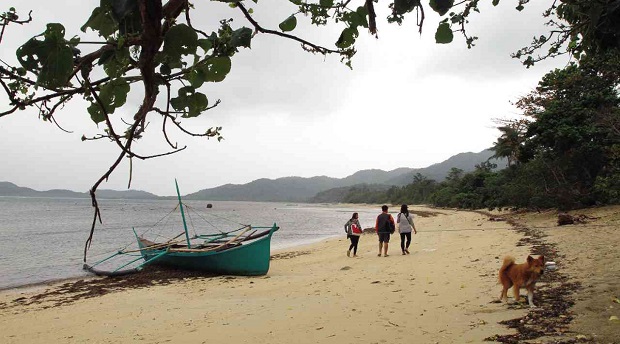Community thrives on Palaui’s bounty

ECOTOURISM GEM This white sand and coral beach is among the attractions of Palaui Island off Santa Ana town in Cagayan province. EDWIN BACASMAS
On the northeastern edge of Luzon mainland, Palaui, a seahorse-shaped island, along with the unique islets that surround it, is gaining worldwide attention for its pristine natural beauty and idyllic tropical landscape.
Due to its economic potentials, the 2,439-hectare island in the town of Santa Ana in Cagayan province, with its white sand and coral beaches, verdant old growth forests and rock formations, is an easy lure for profit-oriented investors who may wish to develop the island into a luxurious tourist destination.
But if the more than 600 residents had their way, along with about 30 households of Agta natives, they would rather keep this delicate island remain how it is today. This despite the prospects of good fortune due to an imminent tourism boom.
These days, the island’s residents, who used to depend mainly on fishing and farming for livelihood, are starting to relish the economic fruits of a growing ecotourism interest in Palaui.
Protectors
Article continues after this advertisementTheir boats and boatmen are now being hired by tourists. Women are engaged to prepare and serve native dishes. Locals get paid as trekking, birdwatching or snorkeling guides. Trained locals provide relaxing massage for the tired travelers.
Article continues after this advertisementAlso, Agta natives, on a limited scale, produce Dorsata honey that is gathered from the forests and sell the harvest to visitors, while weavers produce native handicraft that are sold as souvenirs.
For each economic enterprise, the villagers have organized themselves into associations, with the help of the Santa Ana local government and the Cagayan Economic Zone Authority and other nongovernment organizations. These are under one umbrella organization, the name of which amplifies their
vision as an island community: Palaui Environmental Protectors’ Association (Pepa).
The villagers’ involvement starts as tourists hire any one from members of the Palaui-San Vicente Motor Bancas Association (Pasamoba) the moment they jump off from the local fish port in San Vicente village.
Blessing
The group follows an organized rotation sequence of which boats get hired, with a standard rate depending on the passengers’ destination—from P790 for a 20-minute, eight-seat boat ride to Punta Verde village on the island and back, to as much as P3,800 for a complete tour of the island’s main destinations.
This boat rental enterprise came as a blessing for Palaui residents like Eddiemar Talisic, his wife Russell and their five children.
In his 20s, Talisic was at one time among Palaui Island’s most prolific divers, scouring the bottom of the sea trapping lobsters and spearing fish that are abundant in the surrounding Babuyan Channel.
But tragedy struck the family in 2006 when he was diagnosed with the Decompression Illness (DCI), a disease more commonly contracted by traditional divers. The sickness has since practically crippled Talisic, now 36, forcing his wife to find menial jobs in Santa Ana.
Practical lessons
Today, Talisic operates the family’s boat-for-hire, ferrying tourists to and from the island. The rental that his passengers pay has become an added income for the family, with a portion of it going to Pasamoba as the organization’s funds.
Once guests reach the island in Punta Verde, Elyn Gagote, the designated dispatch officer, determines the number of tour guides needed for groups and assigns the members, also on rotation basis.
For a fee of P300 for a guide, visitors will be accompanied while they move around the island, with a practical lesson on the island’s endemic plants and animals, as they take on the three-hour, 4-kilometer trek to Cape Engaño on the northern tip of the island and back.
The tour guides also act as island policemen, making sure that visitors would not damage Palaui’s natural environment during their stay. Snorkelers will also have locals as overseers, known in the island as “reef rangers.”
For visitors seeking adventure and who get hungry from all the swimming, snorkeling or trekking, here is a catch: There are no stores or restaurants on the island.
But food catering services can be provided for guests through prior arrangements with the Palaui Women Catering Association. It has become another source of livelihood for villagers, as they earn working part-time as cooks and service crew.
“It is a case of the village people helping one another. People come to help even without expecting to get paid,” said Elsa Laddaran, the caterers’ association president, describing how the typical Filipino “bayanihan” (volunteerism) tradition rubs off on every one every time the village hosts a group of guests.
Aside from her duties as a tour guide dispatcher, Gagote heads Island Spa, the association of Palaui residents who provide massage services to visitors.
For every P300 paid to a masseuse for a full-body massage, she gets P250, while the remaining P50 is divided to form part of the organization’s funds, and to buy cosmetics and other materials for the spa.
“We know the income we have been deriving from all these activities may not be that lucrative, but for us, this is just a bonus. There is nothing more rewarding than having a paradise island as our home,” Gagote said.